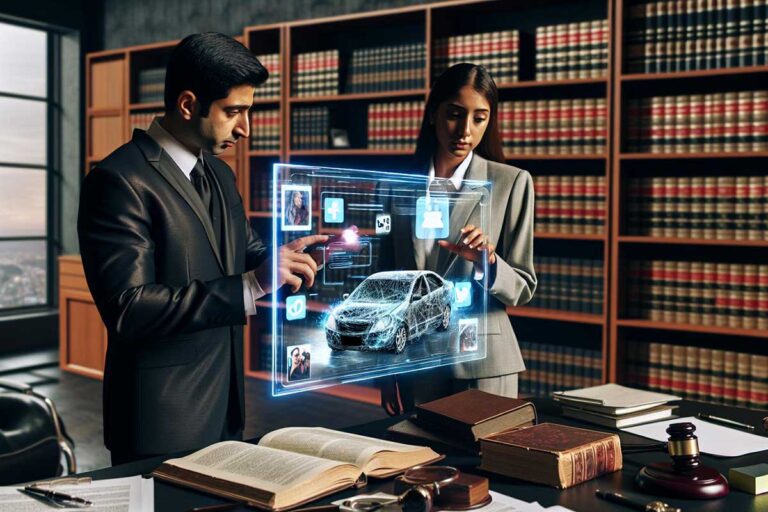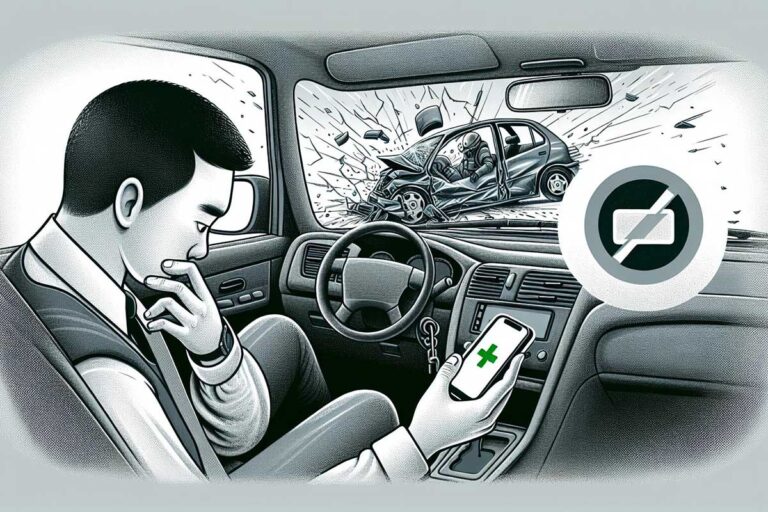The Impact of Social Media on Auto Accident Injury Claims
Social media plays an integral part in our daily lives. However, its implications extend far beyond social interactions, particularly when it comes to legal matters such as auto accident injury claims. This article explores the ways in which your online activities can affect your auto accident injury claim, shedding light on the nuanced ways your public statements may impact the outcome of your settlement. It is essential to grasp the important guidelines regarding your digital presence in light of potential litigation. Reach out to the Jewkes Law Firm today at (770) 771-5130 to understand the impact of social media on auto accident injury claims.
Key Insights
- Social media can influence the outcome of auto accident injury claims. Insurers and defense attorneys may scrutinize your posts to challenge your claims regarding injuries and credibility.
- Protecting your online presence is crucial. Implementing strict privacy settings and being discerning about friend requests can safeguard your claim.
- Consultation with legal experts is vital. Personal injury lawyers can offer guidance on managing your social media activity during the claims process.
Injured In A Car Wreck? Contact Us For A Free Consultation
Injured In A Car Wreck?
Social Media: Ally or Adversary on Your Car Accident Claim?
Social media serves as a powerful tool for sharing life experiences and garnering support. However, it also poses risks for those involved in personal injury claims. Opposing parties can use posts, comments, and photos to question the legitimacy of your injuries or the validity of your claim.
In the realm of personal injury claims, social media can act as both an ally and an adversary. It offers a platform for individuals to express support and share their experiences; however, it also has the potential to furnish evidence that may weaken your claim. Insurance adjusters and defense attorneys may scrutinize your social media posts, images, and comments to contest the legitimacy of your car accident claim.
Disclosing excessive personal information or detailed medical data on social media following an accident can result in direct challenges to the extent of your reported injuries. Essentially, your online activity can equip opposing parties with resources to question the credibility of your claim. Consequently, it is crucial to exercise self-awareness and caution regarding your digital footprint.
The Risks of Oversharing
In today’s society, the act of sharing experiences has become commonplace. However, in the aftermath of an accident, excessive sharing on social media can have detrimental effects that may not be immediately apparent. Disclosing information regarding your physical state after an accident can lead to discrepancies with the injuries you are claiming, which could adversely affect your compensation case.
Furthermore, any activities or images posted online that imply a level of physical capability that contradicts your reported injuries can be detrimental in a legal context. Therefore, it is prudent to refrain from discussing the accident, personal injury claims, or your health status following the incident. Exercising caution is always preferable to facing potential regret in the future. Prioritizing safety should be the primary focus in any decision-making scenario.
The Dangers of Location Tagging
While check-ins and location updates may appear innocuous, they can adversely affect your auto accident injury claim. Such check-ins at various locations or events may raise questions regarding the severity of your injuries and could jeopardize your compensation.
Posting check-ins on social media can furnish the opposing party with evidence regarding your activities and locations. Following a car accident, it is essential to exercise caution to prevent any implications that you are capable of participating in activities that contradict your reported injuries.
Managing Privacy and Friend Requests
In light of the potential hazards that social media may present to your injury claim, it is crucial to understand and manage your privacy settings effectively. Following an accident, adjusting your social media privacy settings can protect you from unwarranted examination during a personal injury case.
Exercise caution when accepting friend requests, particularly from unfamiliar individuals, as they could be insurance adjusters or defense attorneys attempting to gain access to your private social media information. It is important to note that, despite having strict privacy settings, insurance companies can still legally view public posts, and courts may mandate the disclosure of social media content.

Managing Social Media Throughout Your Injury Case
Managing social media throughout your injury case requires significant prudence and tact. The expertise of personal injury attorneys is essential, as they are well-versed in the legal ramifications of social media activity and can guide clients in using these platforms without compromising their claims.
In the realm of a personal injury claim, it is recommended to:
- Refrain from accepting friend requests from unknown individuals
- Avoid posting updates following court proceedings
- Steer clear of discussing the injury claim, communications with legal representatives, or personal sentiments regarding the legal process on social media
These precautions are necessary to protect one’s legal standing.
The Dos and Don’ts of Social Media
Determining what information to disclose or keep private on social media while involved in a personal injury claim is of utmost importance. A prudent guideline is to avoid sharing any new content on social media throughout the duration of the lawsuit, as this could lead to the opposing party exploiting the information.
Additionally, it is crucial to inform friends and family to refrain from posting about you or the incident, as such posts may unintentionally undermine the legal proceedings. Understanding and implementing careful social media practices is essential to bolster and protect a personal injury case.
The Consequences of Digital Engagements
Interactions on social media can have unexpected consequences on your injury claim. Engaging with insurance representatives online may inadvertently affect your compensation. To minimize risks, consider filing your claim through traditional channels instead of social media.
Furthermore, actions that are inconsistent with your statements may be utilized against you, highlighting the importance of exercising caution in your online engagements. To avoid giving opposing counsel detrimental material for your personal injury case, it is recommended that you refrain from commenting on any social media posts.

Seeking Legal Guidance
Engaging with an experienced personal injury lawyer is vital for achieving a favorable resolution in a personal injury case. The experienced lawyers at The Jewkes Firm can provide tailored advice on how to utilize social media effectively while safeguarding your rights. Our professionals possess a comprehensive understanding of how social media can influence personal injury cases. Our team will help you understand the legal ramifications of your online activity, ensuring your posts do not jeopardize your claim.
Protecting Your Online Presence with Legal Support
Legal representation from The Jewkes Firm, LLC, is essential in safeguarding your online presence throughout a personal injury claim. Our services include:
- Assisting you in adjusting your social media settings to private
- Advising against the acceptance of new friend requests
- Providing guidance on prudent social media practices to protect your online identity
It is important to remember that even private communications concerning the case may not be completely confidential and could be revealed through court orders. Therefore, it is advisable to consult with your legal counsel regarding any accident-related matters before sharing them online.
The Importance of Legal Counsel in Overseeing Social Media
Attorneys at The Jewkes Firm are instrumental in overseeing your social media engagement to ensure alignment with your legal case. We offer expert advice on how to address discovery requests that necessitate the submission of social media records during legal proceedings.
In certain situations, our attorneys may recommend a complete halt to social media activity to mitigate the risk of sharing information that could jeopardize the success of an injury claim. This is just one of the numerous ways in which legal professionals can assist in protecting against potentially damaging social media disclosures.

The Consequences of Online Missteps
Mistakes on social media can have serious repercussions on your personal injury claim. Someone who deletes or alters posts can be held accountable for evidence tampering, resulting in potential legal penalties.
Insurance companies and attorneys often scrutinize social media accounts for inconsistencies related to injury claims. This highlights the importance of exercising caution with your social media activities.
Social Media Missteps and Consequences
Missteps on social media can significantly undermine claims and result in diminished settlement offers. For example, sharing images or updates about attending a social event while asserting serious injuries may lead to a decrease in settlement amounts and potential loss of wages, as it compromises the credibility of the injured party’s assertions.
Social media posts that convey a sense of relief at having escaped injury after an accident may be viewed as indications that the event did not cause significant damage, thus challenging the claims made by the injured party regarding serious consequences. These instances serve as cautionary tales, highlighting the importance of careful social media engagement during the course of a personal injury claim.
How to Avoid Common Pitfalls
By being aware of these risks and learning from others’ experiences, you can avoid common errors and strengthen your legal position. Someone who deletes or alters social media posts after an accident can be considered to have spoiled potential evidence. Thus, that person commits a criminal act by modifying or destroying evidence relevant to a legal case.
Therefore, avoiding common mistakes during the legal process of an ongoing personal injury case is vital to prevent self-incrimination and weakening of your personal injury claim. These lessons could prove invaluable in safeguarding your legal rights and securing fair compensation for your injuries in personal injury cases.
Need a Free Consultation? Need a Skilled Attorney?
Free Consultation
Call (770) 771-5130
If you’ve been injured, you need to hire the best legal care to assist you with your claim. Get a FREE consultation today!
Should I Disconnect? When to Deactivate Accounts During a Claim
In certain situations, the most prudent course of action may be to deactivate your social media accounts during the duration of your case. This can help prevent the potential submission of evidence that could weaken your claim and undermine your case. Completely abstaining from social media during the pendency of your claim is an effective strategy to mitigate the risk of misinterpretation. Taking a break from social media allows you to focus on your recovery and the legal process without the distractions of online scrutiny.
Recommendations for Online Activities After an Accident
While navigating the aftermath of an accident, it’s essential to seek expert advice regarding your online activities. Regularly reviewing your content, utilizing privacy-enhancing tools, and documenting incidents privately can help protect your interests.
Understanding the interplay between social media and personal injury claims is crucial in the digital era. The implications of your online activity on your auto accident claim, the dangers of oversharing, and the importance of legal counsel all play significant roles in this complex landscape. By exercising caution and seeking professional guidance, you can safeguard your rights and pursue fair compensation for your injuries. Contact the Jewkes Law Firm today at (770) 771-5130 for a free, no-risk consultation.

GEORGIA PERSONAL INJURY LAWYER NEAR ME
Frequently Asked Questions
Can social media serve as admissible evidence in court?
Yes, social media posts can serve as evidence in court, particularly in disputes regarding the legitimacy of a car accident claim.
What are some prevalent social media pitfalls to avoid during a personal injury claim?
In the context of a personal injury claim, it is essential to refrain from disclosing details about the accident or your physical condition on social media, modifying posts, and engaging with insurance representatives. It is important to be cautious about your online sharing to safeguard your claim.
In what ways can legal representation assist in protecting my online presence during a personal injury claim?
Legal representation can offer advice on adjusting social media settings to private, recommend against accepting new friend requests, and provide general guidance on social media usage to protect your profile during a personal injury claim. This assistance can help maintain your online integrity and mitigate any potential risks to your case.
Should I deactivate social media accounts while pursuing a personal injury claim?
Deactivating social media accounts is frequently considered a prudent measure during a personal injury claim, as it helps eliminate the possibility of inadvertently compromising your case with unintended evidence.
What expert recommendations exist for online behavior following an accident?
Post-accident, it is advisable to routinely delete outdated content, employ a VPN that does not keep logs, and securely document the accident on your device for any online activities.





